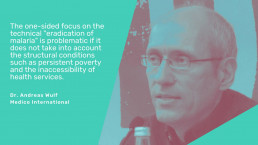Interview with Dr. Andreas Wulf
Gene drive technology carries high risks. Yet it is being promoted by the Bill & Melinda Gates Foundation as a solution to malaria. On the occasion of World Malaria Day, the Stop Gene Drives campaign is launching a project that presents different perspectives on how to combat malaria.
In this interview with Dr Andreas Wulf, physician and global health officer at Medico International, we wanted to find out what conditions have to be met in order to implement the human right to health and what role the Bill & Melinda Gates Foundation plays in international health policy in selecting measures such as those to combat malaria.
Who decides on the choice of measures to combat malaria – what interests prevail?
The Global Fund to Fight AIDS, TB & Malaria has become the world’s largest donor of malaria control, providing more than 50% of the global funds available to poor countries. The programmes are developed by the countries themselves and focus on classic public health measures (health education, prevention by insecticides and bed nets against the mosquitoes, rapid diagnosis and treatment of the sick with effective combination drugs. As a result, many countries have seen substantial successes in the reduction of malaria, and in particular in the elimination of malaria, and it is essential to continue. However, structural problems in the fight, such as persistent poverty conditions, armed conflicts that make access to affected areas impossible, and currently the interruption of programmes by Covid19 lockdowns and border closures are not solved by such public health programs. Thus, a one-sided focus on a technical „eradication of malaria“ is problematic if it does not take structural conditions into view.
How do you rate the Gates Foundation’s commitment to international health policy in general and to the fight against malaria in particular?
The Gates Foundation has become a dominant player in international health policy not only through the enormous financial resources it promotes research, development and implementation of health programs (for example, it is the largest donor to the WHO polio eradication program), but especially through its strategic initiatives to promote public-private „partnerships“ such as GAVI, the Vaccine Alliance, and currently the access to Covid19 Tools Accelerators. There is a great danger that conflicts of interest between private and public actors will be systematically hidden, as is currently seen in the debates on patents for Covid19 vaccine, in which the Gates Foundation actively strengthens the interests of the large pharmaceutical companies.
The Gates Foundation’s tendency to favor technological solutions to complex health problems is particularly evident in malaria: it actively promotes research into the genetic modification of mosquitoes (gene-drive strategy) to block the transmission of malaria pathogens. More problematic, they are so convinced of the goal of a possible eradication of malaria that they are displacing other voices who are more in favour of a possibly more realistic and community-oriented „control approach“ with their dominance in research funding.
What factors often stand in the way of the human right to the best possible access to health in Africa? What factors are relevant for the prevention and treatment of malaria cases and should be addressed as a priority?
Basically, good living conditions are needed in order to realize health rights individually and collectively. Food, housing, income and working conditions, peace and fair access to them for all are key factors that go far beyond the level of action of health systems and which– not only in African countries – mean massive inequalities in the realisation of health. Malnutrition, for example, exacerbates the severity of malaria and the risk of dying from it. In addition to these „social determinants of health“, all people must have the knowledge about and the availability of prevention (fighting and protection against mosquitoes), diagnostics (rapid tests) and treatment (medicines, inpatient treatment in severe cases), regardless of the financial possibilities. The physical accessibility of health services, preferably public, free of charge, in which malaria programs are integrated, is also a problem in many African countries, which must be addressed not only by technical methods (e.g. research on drone operations for the distribution of drugs and tests) but above all to systematically strengthen and support community health workers not only in remote rural areas but also in poverty regions of the megacities.
—
More interviews have been held with:
Ali Tapsoba de Goamma, human rights activist, and spokesman for an alliance in Burkina Faso against the release of Gene Drive mosquitoes in his home country, on the malaria control measures implemented so far and the attitude of the local population towards the planned field trials with Gene Drive mosquitoes.
Click here for the interview
Pamela J. Weathers, professor and researcher at Worcester Polytechnic Institute in Massachusetts, USA, on the efficacy and controversial safety of Artemisia tea infusions for treating or preventing malaria.
Click here for the interview

